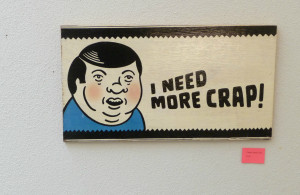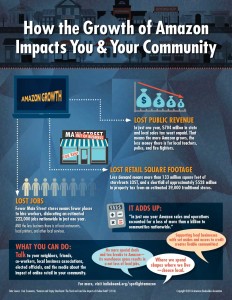
After shopping regularly on Amazon since 2004, I quit shopping there in 2019.
This post will tell you how I did it, how I made the transition to life-after-Amazon as easeful as possible, and how this decision has helped me step into deeper integrity.
Importantly, I am primarily writing this for people who already understand Amazon is detrimental to society and desire to make the switch, but are overwhelmed by the ubiquity of Amazon and don’t know how to go about it.
I’m not going to lie to you — it will take an effort to break from the biggest retailer in the country. However, my hope is that the strategies & reflections below will cut through the complacency and bring that part of you that wants to more fully to the forefront.
The post is written section-by-section, so feel free to bounce around the table of contents.
Table of Contents
What Quitting Amazon Will Ask of You
While it’s easy to focus on looking for alternative retailers, the real way to transform our behavior is to look inside.
Personally, my ability to seamlessly quit Amazon, as well as other things over the years, such as alcohol, passive-aggression, fast food and dairy, has come more through introspection than strategy. In turn, here are a few points for consideration that I’ve found very helpful:
Be okay with a little discomfort
I notice three primary types of quitting-Amazon-discomfort, and while I will explore each one in detail, the unifying question is this:
“what’s more important to you: integrity or comfort?”
Really, you could disregard the rest of this post, and just focus entirely on that question. If you maintain a strong conviction that Amazon violates your personal value set, then the details of quitting will work themselves out. That being said, here are some thoughts on the three types of discomfort:
- Money discomfort. Yes, you might occasionally have to spend 10% more to get your items elsewhere. And yes, it’s very possible you’ll experience a little reactivity at spending $20 more to shop elsewhere for your bed-frame-in-a-box, a bottle of vitamins, or a new blender.
.
However, while the typical American ethos is, how far can I stretch my dollars to get as much as possible, I reframe the ethos to, how can I make sure that every purchase lines up with my integrity. In other words, instead of focusing on how much more it costs, I focus on how aligned my purchases are with my values — and that delight-of-mind is priceless.
. - Convenience discomfort. Yes, Amazon has positioned itself to be an incredibly convenient place to shop. Other places are quite convenient too (see below), but Amazon is certainly #1. You may very well have to spend an extra 10 minutes searching for it online or actually going to a store. However, when this happens, I don’t frame it as it would be so much more convenient to just buy Amazon, but rather, it feels really good to be in integrity with my purchases. In this way, the discomfort is very mild.
. - Time discomfort. Yes, you might not be able to get items within 12 to 48 hours if you buy elsewhere, unless of course you leave the house and use your dollars to vote for your local economy. However, do you really need items that quickly? Like, really? Up until the past few years, getting things immediately was virtually unheard of. If you’re noticing this impatience arise, it’s a good opportunity to look at your relationship with consumerism (see below).
. - When discomfort dissolves. Initially, the emotional discomfort will feel more pronounced, but as time goes on, and you fully “buy-in” to the new mode of being, your comparing mind will stop complaining, and the discomfort eventually drops entirely. You just shop elsewhere and don’t really think about it.

Internalize the why on an emotional level
While taking in information and building a critical understanding of the problem is certainly useful, it’s generally not enough to instigate true behavioral change. For that, there needs to be some emotional movement.
This can happen in many ways — watching a powerful documentary, hearing the conviction of people you respect, seeing firsthand the negative impact, or doing your own research and allowing yourself to really feel the impact, etc.
For me, the “emotional movement” came with the onset of the Covid-19 pandemic. Even though my income was dramatically cut, and I certainly had fear responses kick in that said, I need to live as cheaply & conveniently as possible, I deeply reflected on that, and considered an entirely different question: what feels like the most important thing in the world to put my limited resources towards? What I landed on was a desire to make sure I was using my dollars, however many I had left, to make society a better place.
In turn, on an emotional level, it felt very clear to me that one way to do this was supporting small businesses, and people like you & me struggling to make ends meet. Inversely, it was just as clear that supporting Amazon was like pouring gasoline on the societal fire.
In summary, there are many routes to emotional resonance, but it’s an essential step.

Contemplate your relationship with consumerism
There is a difference between capitalism and consumerism.
Capitalism refers to an economic system that allows for the easy exchange of goods and services among individuals. In contrast, consumerism is an ethos that suggests the ultimate good is found in having bigger, more, better, and increasingly novel possessions and experiences. We’re talking about an exchange system vs. an approach to life.
I don’t take any issues with capitalism, but I see consumerism as a fast-track to unhappiness. It seems to breed upon a sense of lack. In turn, seemingly around every corner/webpage someone is trying to get you to buy something. They are essentially saying, you aren’t good enough as you are, but if you bought this thing, then you would be a little better (though by the way, you’ll never actually be completely okay). What a bunch of nonsense this is!
The notion that you already have enough, or that there could even be a thing called enough is the ultimate taboo in this society. This runs so deep that most of us never actually stop to question the matrix we’ve found ourselves in.
Coming back to Amazon, one powerful way to release our grasp on its comfort is to deeply contemplate our understanding of what constitutes happiness/enough.
What if it came more from being content with what we have than from having a lot or more? What if it was more about how much we gave? What if it related to the sustainability and ethical standards of the organizations and products we were purchasing? Does buying as cheaply and conveniently as possible really help create a world we want to live in?
Bringing this all together, I’ve found a single question has been very powerful in shifting my relationship to consumerism, and, by extension, to Amazon:
“what’s motivating my purchasing habits?”
Is it a sense of lack? Or is a genuine sense of improving my life? Personally, I let go of the former and tread lightly with the latter.

How to Quit / What Are the Alternatives?
- Google Shopping
.
This is my go-to shopping tool. I like that you don’t actually buy the item from Google — rather, they just offer a portal to find retailers all across the web selling a particular item, including smaller businesses as well as sites like Etsy and eBay. You can also see who has the item on sale.
.
It’s not the best for doing your actual product research, but once you’ve figured out what you intend to buy, look here.
. - eBay
.
Just about anything you can find on Amazon, you can also find on eBay. Once upon a time, eBay was all auction-style used items, but they’ve come a long way, and have enormous amounts of brand-new merchandise from reputable businesses.
.
As a bonus, their used & refurbished merchandise selection is actually much greater than Amazon’s. I buy a lot from eBay, though be careful — a number of eBay stores re-list Amazon items here for a small markup. However, once you’ve been shopping here for a bit, these are usually easy to spot.
.
- An impressive compilation of Amazon-alternatives
.
The linked article is well organized and lists loads of ethical Amazon alternatives both for general shopping, and for many category-specific items. It’s a little dated now (as of 2024), but still lots of good links!
. - Search for the Business off of Amazon While some businesses exclusively sell on Amazon, quite a large number have their own website, and also sell on other retailers such as eBay, Etsy, or industry specific stores. In turn, if there is something you feel compelled to purchase on Amazon, before hitting “buy,” search for that company on your favorite search engine and cut out the middleman..
- Buy Local
.
The benefits of buying local are very large, literally giving a slice of your income to your neighbors who will support your other neighbors (and on and on), rather than giving it to some company that really doesn’t care about your local community. but in trying to avoid convenience-discomfort, it can be very easy to just purchase online. While this requires a little more convenience-discomfort, one gets a proportional integrity boost!
.
There are also so many brick and mortar stores carrying everything from board games to pet supplies to car accessories to socks. It might surprise you how much you can find at local stores!
.
Also worth mentioning, I buy as much as possible second hand. I’ve bought many hundreds of used items over the years locally through Craigslist, Facebook Marketplace, and thrift stores. Similarly, there are “Buy Nothing” groups all over the country that are committed to giving things freely to neighbors. I am part of one of these groups via Facebook Groups, though you can also find them through internet searches.
.
Of course, people don’t like this one because it requires a little more convenience-discomfort. However, one gets a proportional integrity boost for just doing it anyway!
.
- Do you really need it?
.
Before buying, genuinely ask yourself this question. It stems directly from the contemplation of what motivates our purchasing habits. Curiously, when I’ve told this one to people in person, they usually just shrug it off, but it’s actually a serious question!
.
When I scanned through my Amazon purchase history in the years before I stopped buying there, I noticed around 10% of the items were pretty clear I don’t actually need this purchases. And another 10-30% were things that were nice and helpful, but I could have easily done without. The majority of the rest fit into the above categories of I could easily get this elsewhere.
.
Basically, what if this was the opening question for all your purchases, on Amazon or elsewhere?
.
- Books & audiobooks
.
As a Portlander, I’m immediately inclined to shop at Powell’s books (the largest independent book store in the country, but indiebooks.org and bookshop.org are both present solid alternatives for new books. For used books, I often start with eBay or Google Shopping, but Thrift Books and Alibris have been two companies I’ve also used. Note: Abebooks is owned by Amazon.
.
If you are keen on audiobooks, I primarily use audiobooks.com and audiobooksnow.com, though there are many others as well.
.
I once wrote a small book publisher that I like to support and asked them why the book they published was cheaper on Amazon than their web store? They told me Amazon was literally selling the book below their cost. I cover this further below, but the basic reason is to put other companies out of business, gain market share, and then once no competition is left, raise the prices. In turn, even if it’s cheaper on Amazon, is it really worth supporting that strategy?
. - Other Big Box Retailers
.
I don’t really like shopping at any of the big box stores, such as Target, Home Depot, Walgreens, Lowes, Costco, and especially Walmart. I generally make an effort to look elsewhere first, but I occasionally still buy from some of these companies, as with some products, it can be hard to avoid.
.
Importantly, even though all of these companies are certainly cogs in the consumerism system, apart from Walmart, I see them as much better than Amazon for two reasons.
.
Firstly, they do not have as much market share, and thus have nowhere near the monopoly-like sway or impact that Amazon does — for capitalism to be beneficial for the masses, healthy competition is essential. Secondly, from what I understand, these companies actually pay a reasonable share of taxes, both local and national, which has a societal benefit..

Can You Really Quit Amazon?
As this short article outlines, it’s actually much harder to boycott Amazon than one might think. Sure, you could successfully stop shopping on Amazon.com, and even skip Amazon subsidiaries, such as Whole Foods, the Washington Post, Zappos, Alexa and IMDb, but Amazon web hosting services run a significant portion of the internet. Even major websites such as Netflix, Spotify and Reddit are run on AWS, Amazon Web Services. Amazon has also apparently made its way into supplying local and government contracts with various supplies.
In other words, they are exercising monopoly-like influence, and it’s actually very hard to fully boycott them. And, even if you do, a gazillion other people won’t, and their influence will only grow.
I say this all to get across an essential point, which is perhaps one of the most important lessons I’ve learned in life:
Your well-being relies more on your intentionality, and your commitment to your own integrity, than it does the outcomes of your actions.
Of course, our actions do matter, but as a wise person once said, “no one can do everything, but everyone can do something.” In turn, I find that when I commit myself to my own integrity, to aligning my actions with my values, to my little slice of something —regardless of what I’m up against—that is when I have the most powerful impact on the world.
To keep it to the Amazon Marketplace, I completely abstained from buying anything from them for about 4 years, so it is definitely possible.
That being said, since around 2023, I softened my perfectionist tendencies and now buy something from Amazon around once or twice a year. Importantly, I will always make a notable effort for other options first. And, quite often, if Amazon is the only option, I just won’t buy it. However, very occasionally, there is something that feels worth the trade-off. In other words, it’s an absolute last resort.
Usually, it’s something like they are literally the only place I can get the audiobook due to an exclusive contract, or it’s an independent writer who self-published their book only-for-sale on Amazon. One time I was on a very tight deadline during a very busy week, and a piece of tech broke that I needed to finish the project — it would be two days before I’d be able to go to a store to get it, but Amazon would deliver it within 12 hours.
Rather than get too frustrated or self-critical about once-in-a-blue moon purchases, I cut myself some slack. I don’t need to be perfect to make a difference. I’ve gone from about 75% of my purchases on Amazon to maybe .1%. That matters.
So can you quit Amazon? Certainly. Will it be easy or comfortable? Not likely. Is it worth it? Definitely. Do you need to be 100% perfect for it to count? Not in my opinion.

Why Quit Amazon
I write this post primarily for people who already understand the why; however, I will still offer a few reflections on which reasons stirred me emotionally (and rationally), and led to my change-of-behavior.
Note: I originally wrote this in 2019. I may update it at some point, as the news keeps rolling in, like how recently they fired 100,000 employees to be replaced by robots, or how even more recently they announced that in spite of making 59 Billion USD in profit last year, they are going to lay off 14,000 employees in order to “cut costs”.
Basically, as AI gains more and more prominence, you can be assured that Amazon will be at the cutting edge of maximizing profit, laying off humans, and squeezing vendors with every ounce of leverage they have.
Anyhow, please note, I make no effort to be a proper journalist, and encourage you to take this section with a grain of salt. Do your own research.
If after reading this, you remain curious about the why, you could read this 79-page research report, aptly entitled, Amazon’s Stranglehold: How the Company’s Grip is Stifling Competition, Eroding Jobs, and Threatening Communities. Inversely, you could also just google, “why is amazon bad,” and follow the rabbit hole. Anyhow, here’s three specific reasons:
Bad for the economy
There are a number of great articles about this on the web, including the above report, and this one from the Sun, which focuses on their monopoly-like status, but here are some thoughts:
- A poignant quote: “a September 2016 report from economic analysis firm Civic Economics says that Amazon online sales — in 2015 alone — accounted for a loss of more than $1.2 billion of revenue to state and local governments. The report also estimates that in just one year Amazon sales displaced the equivalent of 39,000 retail storefronts and 220,000 retail jobs.” My understanding is that those figures factor in jobs Amazon has added.
. - As in the quote, there is a strong correlation between Amazon gaining marketshare, and local businesses going out of business — sure this is a general trend of online vs. local, but it’s made worse by the fact that Amazon intentionally sells products at a loss to (1) pay a fraction of the taxes other businesses do, and (2) gain marketshare by putting their competitors out of business.
How does this work?
One reason is that they actually make over half their revenue from their web hosting services. In other words, they make so much money from their other businesses, that they can run Amazon.com at a loss, undercutting their competition until they go out of business, and then gaining market share. Another way this works is that since they are gaining marketshare, even though they don’t officially turn a profit, their stock price skyrockets, and thus their leadership becomes obscenely wealthy. If you read the Sun article, you’ll see how they actually have employed this in a very unethical way to put other real businesses out of business.
. - They seem like a free & open marketplace, but they steer business towards their own products, or people who use other Amazon services, rather than towards the truly best product.
. - As local businesses shut down, you have more people jumping at their $15 an hour warehouse jobs instead of running small businesses that would earn significantly more than that. Consider this: would you seriously be able to support your family on $15 an hour?
Bad for workers
I’ll keep this one simple: numerous articles depict them treating workers more like robots than humans. To Amazon, human labor is disposable, and rather than nurturing and developing a labor force, the impression I get is they try to dehumanize workers as much as possible, instilling noteworthy hurdles to things like using the restroom, talking to other humans or, you know, basic compassion.
The heartbreaking thing is people are actually flocking to these jobs; although, I suspect not because they feel good about them, but because they’re desperate. I’ve been in those shoes before, struggling to pay rent, and I would have worked just about anything to not go under — it’s difficult to understand this reality unless you’ve lived it, but for a large segment of the population, this is the water they swim in.
Of course, the problem here is much bigger than Amazon, but as in the “bad for the economy” section, they represent the essential case-study of how capitalism can go sour when one company has too much power.
Buying from Amazon is supporting an economy that increases the sector of people who don’t make a living wage, increases the wealth disparity, and also creates a larger-scale work environment that rips apart the human spirit.
Jeff Bezos has questionable ethics
Obviously, I don’t actually know Jeff Bezos, so this section is largely speculation. However, as a general note, it’s not my style to ride the corporate-executives-are-evil train, and I actually have favorable opinions of the founders/owners of a few of the other largest corporations in America.
All that being said, everything I’ve read about Mr. Bezos, the owner of Amazon, suggests to me he is a person with very little empathy, incredibly cutthroat, and is primarily motivated by a pathological degree of competitiveness and desire for power. He is not a person I feel good about having a major influence on the flow of our country. This article paints an interesting overview.
On a bright note, after a long history of practically zero philanthropy, he did recently commit 10 billion, around 7% of his wealth, to climate change. So I’d like to throw him a little bone there, but it’s going to take a lot more than that to radically change my take on him.
In any case, rather than taking my word for it, I encourage you to do your own research, and come to your own conclusions.

Summary
The purpose of this post is not to shame anyone for their purchasing habits, or to suggest that boycotting Amazon is even the best way to go about life. Rather, I am merely sharing my process and some decisions that have helped me step into deeper layers of peace and alignment.
I welcome everyone to have their own opinion and approach on how to best live this precious life. In turn, I leave you with a more general question to help you come more fully into your own:
With respect to your purchasing decisions, how could you step into fuller integrity?

This is a good move and I feel a kind of freedom getting the things i need for myself and others from local sources….at least in my own country. I fully understand what the A. model is doing to our lives. This is the ugliest workings of capitalism, nowhere near the so called innocent “free market” and its invisible hand. I have also had many trying experiences with all the logistics problems buying from other big box stores. Its always much better to deal directly with the sellers in smaller enterprises. Thanks for writing on this important subject.
I dont shop Amazon because I want to or I’m addicted. I shop Amazon because with this new business dynamic where my stores DONT STOCK ANYTHING. I HAVE TO. There are items in this world we need to get sometimes that i’d love to be able to go to a store to get, that years ago you could. If Amazon is the only place to get. I dont have a choice. I have NEVER had a pleasant experience with Amazon. I have PTSD from dealing with Amazon or knowing I have to. NOBODY regulates or holds this company responsible for anything they do, or any of their crooked business practices. Somnetimes its not about having some desire to buy, but having NO CHOICE
Martin, you always have a choice.
You definitely have choices – you also do not NEED as much as you think you might.
Agree with Lily, you always have a choice. And the way search engines work, Amazon will often show up at the top of them acting like they’re the only ones to sell something and it’s just a lie because they literally flood the zone and make you think there are no other options.
Hint: When you do an online search, type “ -amazon “ after the search term (no space between the hyphen and amazon) so they don’t even show up in your searches (i.e., “ bookshelf -amazon “). Reduces temptation and helps one get over the addictive nature of these billionaire run scammer companies.
(I haven’t shopped at Amazon in over 8 years now, don’t miss it not even a little).
My struggle is ordering from ebay and then an amazon delivery is at my door. How can we curb the using of ebay sellers that are actually just amazon vendors? I feel like I’m being tricked. I can’t get away from them and it feels dystopian.
Also, you may have to drive quite a distance to get the same product, or you may have to go to several stores. That requires an automobile, gasoline, etc. Are you really saving the world by boycotting Amazon?
I completely understand! I’ve had the same thing happen a number of times & it likewise feels like I’m being tricked. I often leave negative feedback and state this reason, but while that might disincentivize a particular seller, it doesn’t really solve the greater problem. It’s actually to eBay’s benefit to allow this, so they would never curb it (why would they remove a 10% cut on what’s probably billions of dollars of sales for them?).
That being said, I’ve started to get a feel for which items are clearly just going to be sent from Amazon — the stock photo, the same item is on Amazon but a few dollars cheaper, the listing completely generic, usually from an account with less transactions, and if I click on their profile, it’s just all Amazon looking listings, etc. Sometimes I actually message them beforehand and ask if they are going to send it from Amazon. Sometimes I just choose the one that is clearly not from Amazon. Sometimes I just skip eBay altogether and look elsewhere online. Sometimes I just buy locally. Sometimes I just don’t buy. Sometimes if it’s something I really seem to *need* and don’t have all the time in the world to figure it out, I just pick one on eBay and hope for the best.
Since I’m 69 years old I have decades of shopping experience behind me way before Amazon ever came along. The straw that broke the camels back with them for me was that they have now begun forcing their Prime membership on any and all orders placed with them. They’re actually being sued for this right now because of the manipulative and deceptive way they go about it when you place an order….and still they have not stopped doing it.
So today I shut it down. It’s going to be just fine. I didn’t need them for decades; I certainly don’t need them now.
How do you navigate this when you are in a partnership, relationship, have to consider other people in your household?
Well, you can’t control other people’s behaviors, but you can control your own. You can share your reasoning, but without adding pressure or criticism on them. If they continue to buy from Amazon, that’s on them. However, if it’s the situation where you co-buy things like household items, I would hope there is a climate of respect & open communication in the household, where if one person has a strong conviction, the others can respect that and go along with it. Of course, I understand this isn’t always the case. Especially when they don’t agree with you or maybe they get the idea, but just don’t care and don’t want to be inconvenienced. It’s a little harder here. But ask them what is the part that most compels them to keep using Amazon in spite of your objection. Is it the cost? The quickness of delivery? The convenience? A more emotional affinity for Amazon? Something else? Once the reasoning is clear, perhaps you can find a middle ground, or some way where everyone’s need can be met. Maybe alternative solutions can be had. Try some experiments, like “let’s try out Google Shopping or Ebay for a month and see what that’s like.” In the end, it doesn’t need to be a winner take all situation. Like their way or your way. There’s probably some middle ground. And certainly, without the ability to empathize with each other and at least listen to each other’s perspectives — in both directions — it’s all going to collapse pretty quickly. Hope this helps!
Hi thanks for the article. I quit Amazon today before I found your article but it reassured me I did the right thing. I looked on Amazon for a new pair of sneakers. $49 not bad. Someone posted them go to the actual online store. Found them there for $42 and a promo code. I found lots of varieties on the actual shop. Used the promo code and got two pairs guilt free!!
I found that the items I ordered on Amazon, I could find directly from the manufacturer at the same price or even less, and with free shipping. Amazon is charging manufacturer’s up to 20-25% more to put their items on the Amazon website and then passing the costs on to consumers. We all think we are getting a great deal by shopping on Amazon, but the fact is, no one shops around any longer. We all go right to Amazon so they have all of the market. SHOP AROUND! You’ll find that either you didn’t really need it in the first place, or you can find a better deal on a different site. Amazon is not where it’s at any longer. They are a greedy conglomerate and they are horrible for the environment.
We quit Amazon in 2016, along with Home Depot, Target, Panerra, and other big box chains. Fortunately my spouse and I talked about what our shared values are so it was fairly easy to quit. Another idea is to join Buy Nothing. It’s local communities where members gift items and make requests for things that they may need. Here is the link: https://buynothingproject.org/. We also belong to our neighborhood list serv that encourages gifting as well. It’s a great way to give neighbors things that we don’t need as well as getting wants or needs gifted to us for free! Thank you for this article it was very thorough and mentions some provocative thoughts/questions to ponder as well as shopping alternatives.
kudos to all who quit amazon before Mr. Bezos got my attention with his ethics. after inauguration, it is clear he cares not a whit about the American democracy, when he thinks he can gain more power and money. Only one move can get his attention. We have the power to make that move. And yes, I am rethinking things I’ve done which have ditched our local community and the people locally with whom I live and work.
I already quit the Washington Post. Now it’s time to leave Amazon and Whole Foods. Personally, quitting Whole Foods will be much harder than leaving Amazon. It’s the closest grocery store to me and has lovely fresh organic veggies. The upside is that I’ll be going to the farmer’s market a lot more this summer. yes, it takes more time and effort and money to leave the conveniences behind, but I want to feel better about where my money goes. We Americans are so pressed for time. Maybe we need to just turn off the TV and put down the devices and spend those gained hours more mindfully. Thanks for this encouraging article.